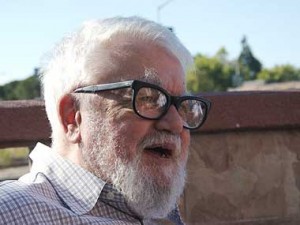The world has lost another computing pioneer with the death of John McCarthy . While not a household name, McCarthy, who died on Sunday at the age of 84, coined the term artificial intelligence, a term popularised in science fiction.
For such a giant in computer science and a master of complex philosophical and mathematical ideas, he faced long odds. Born in 1927, his family lived an itinerant life to make ends meet during the Great Depression. As a teenager, he taught himself mathematics from textbooks used at Caltech , where he would later earn his maths degree.
McCarthy came up with the term artificial intelligence in a proposal for a summer research project and conference at Dartmouth College in 1955. He co-wrote the proposal with fellow AI pioneer Marvin Minsky , then at Harvard University; Nathaniel Rochester of IBM ; and Claude Shannon , then at Bell Labs. They thought: “If a machine can do a job, then an automatic calculator can be programmed to simulate the machine.”
[caption id=“attachment_116764” align=“alignleft” width=“380” caption=“John McCarthy by null0 from Flickr”]
 [/caption]
[/caption]
In the proposal, McCarthy and his colleagues thought that the limiting factor for artificial intelligence in the 1950s wasn’t the rudimentary computers but the rather rudimentary software. They wrote:
“The speeds and memory capacities of present computers may be insufficient to simulate many of the higher functions of the human brain, but the major obstacle is not lack of machine capacity, but our inability to write programs taking full advantage of what we have.”
In 2006, Dartmouth College marked 50 years since the seminal conference. McCarthy told technology site CNET that he came up with the term artificial intelligence in writing a proposal to get funding for the research and conference from the Rockefeller Foundation, but that the name had more to do with participants than the funder. He said:
“Claude Shannon and I had done this book called ‘Automata Studies,’ and I had felt that not enough of the papers that were submitted to it were about artificial intelligence, so I thought I would try to think of some name that would nail the flag to the mast.”
McCarthy and Minsky founded the AI Group at MIT before McCarthy moved on to Stanford, where he served on the faculty for four decades and set up the Stanford Artificial Intelligence Lab (SAIL).
In addition to AI, McCarthy is also credited with creating the programming language LISP, the second oldest high-level programming language. Fortran is older, but only by a year. LISP became the de facto standard language for AI researchers, and it’s still in use.
The Stanford School of Engineering confirmed his death on Twitter and said of him :
“John McCarthy coined the term “artificial intelligence” & never stopped working to give machines the gift of common sense #aiclass #mlclass”
Tributes poured in from across the web. Wired senior writer Steven Levy said on Twitter, with a reference to AI virtual assistant Siri on the iPhone :
“Broke news to Siri that John McCarthy, father of Artificial Intelligence, died. She took it well, but we humans will miss him.”
Common sense genius
Of course, while McCarthy had grand visions for artificial intelligence, the term in popular culture has come to mean computers run amok as much as it has the lofty goal of man wanting to build a carbon copy of his own intellect. With every new advance in artificial intelligence, there is the perfunctory reference to Skynet, the malicious AI in the Terminator series of movies.
Nathaniel Rochester, his collaborator on the seminal 1955 AI proposal, worked on AI at IBM, but the company ended that programme when its marketing department found people were scared by the idea of “electronic brains” and “thinking machines” .
One of the things that McCarthy has been most remembered for was his level headed view of AI.
He was ready to acknowledge the limits of not only computers but more importantly of human knowledge. In 1979, he wrote :
“It’s difficult to be rigorous about whether a machine really ‘knows’, ’thinks’, etc., because we’re hard put to define these things. We understand human mental processes only slightly better than a fish understands swimming.”
In the early days of AI, McCarthy had predicted that a computer would beat a human in chess by the 1970s , but that feat didn’t come until 1997 with IBM’s Deep Blue supercomputer .
McCarthy wasn’t impressed. Chess has often been compared in terms of AI research to fruit fly, or Drosophila, research in genetics.. Quoted in Science, he said :
“However, computer chess has developed much as genetics might have if the geneticists had concentrated their efforts starting in 1910 on breeding racing Drosophila. We would have some science, but mainly we would have very fast fruit flies.”
)